Key takeaways:
- Meal planning transforms cooking from a chore to a creative and enjoyable process, reducing stress and food waste.
- Recognizing burnout signs, such as monotony in meals and anxiety about planning, is crucial for maintaining a positive relationship with food.
- Personalizing meal planning through flexible frameworks, batch cooking, and seasonal ingredients enhances creativity and sustainability.
- Staying motivated in healthy eating involves exploring new cuisines, visual reminders of goals, and tracking progress to understand the impact of food choices.
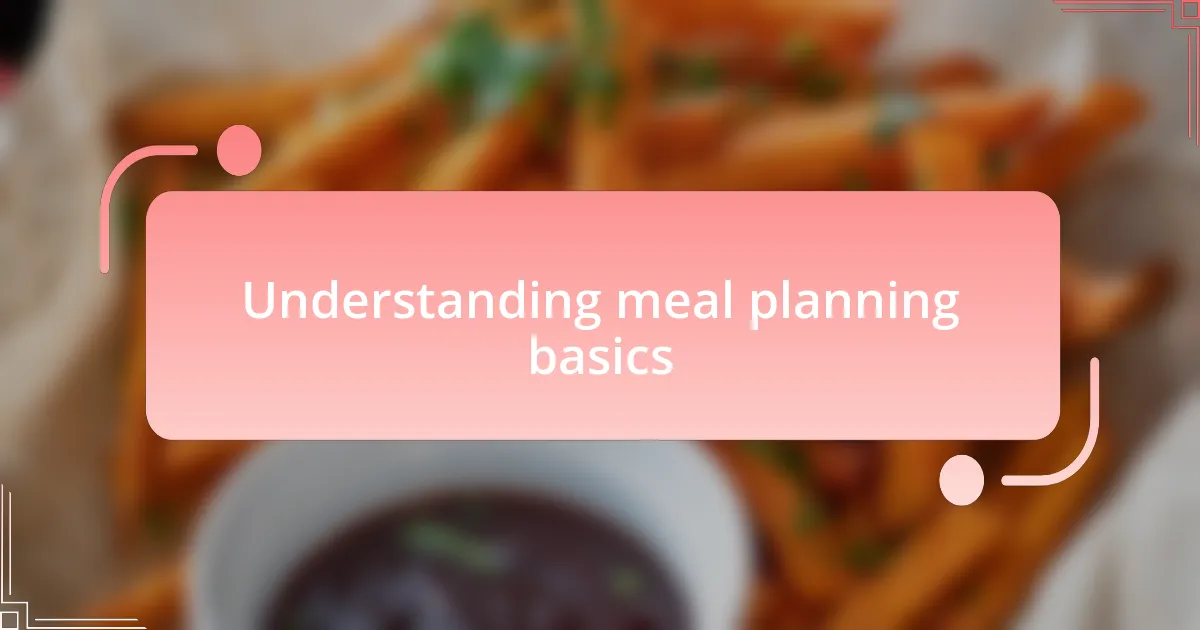
Understanding meal planning basics
Meal planning is fundamentally about organizing your meals in advance, and that’s where the magic begins. I remember when I first started planning my meals, it felt overwhelming. But as I learned to outline my week, deciding what ingredients to buy and which recipes to try, I discovered a new rhythm in the kitchen that made cooking less stressful and more enjoyable.
Understanding the basics also means recognizing that meal planning is more than just a grocery list; it’s a way to nourish both your body and your mind. I still recall the relief I felt on those busy days when I could simply grab a pre-prepped meal rather than scrambling for something last minute. This practical aspect illustrates how meal planning can be a real game changer, don’t you think?
At its core, effective meal planning involves knowing your schedule and being mindful of your dietary preferences. I learned to ask myself questions like, “What do I genuinely enjoy eating?” and “How much time do I have to cook this week?” This introspection transformed my meal planning from a chore into a creative process, fueling my passion for healthy eating and helping me to avoid the burnout I once experienced.
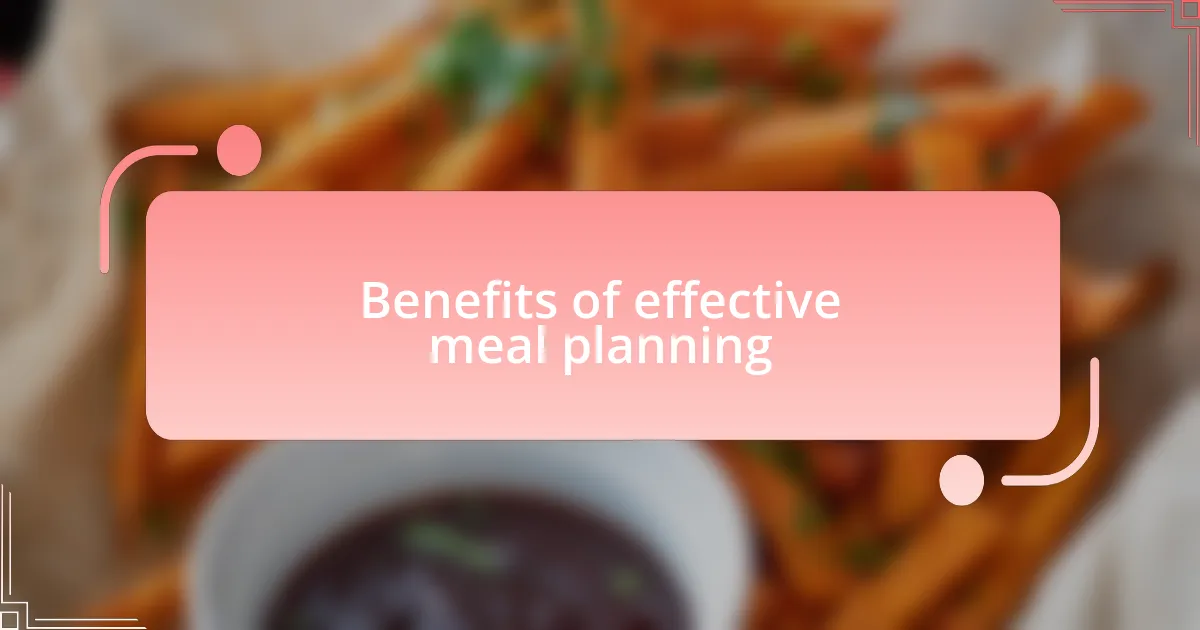
Benefits of effective meal planning
Effective meal planning has profound benefits that extend beyond just saving time. When I first started, I was amazed at how it helped reduce food waste. Planning meals meant I could use ingredients before they spoiled, leading to both financial savings and a more sustainable lifestyle. Have you ever thought about how much food we toss out weekly? Once I became more aware of this, it motivated me to be more intentional in my choices.
Moreover, meal planning can enhance your nutrition significantly. I noticed that by pre-selecting meals, I was more inclined to incorporate a wider variety of fruits and vegetables into my diet. It turned into a fun challenge to try new recipes that I might not have considered otherwise. Isn’t it exciting how meal planning can open up opportunities for both exploration and nourishment?
On a personal note, meal planning has brought a sense of routine and stability to my hectic life. I remember the comfort of knowing that a healthy dinner was just a few steps away, even on my busiest days. This organization not only improved my cooking efficiency but also allowed me more time to connect with family and unwind after a long day. How much more enjoyable is cooking when you’re not racing against the clock? Planning ahead made the kitchen a place of creativity rather than chaos.
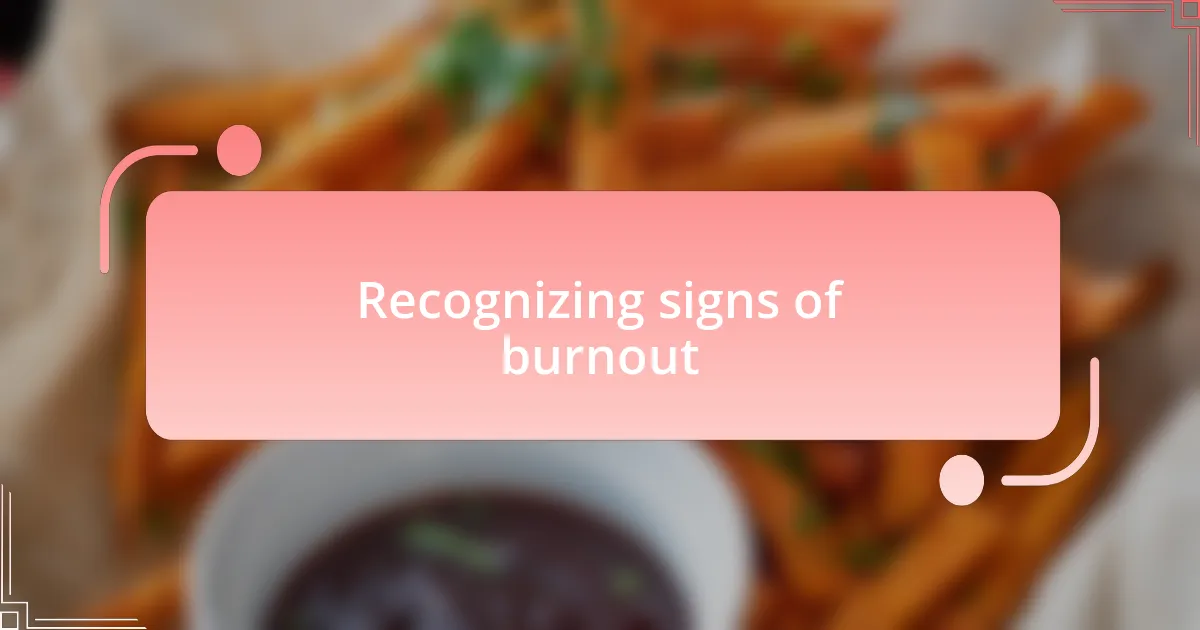
Recognizing signs of burnout
Recognizing the signs of burnout can be a subtle yet important process. I remember when meal planning started to feel like a chore rather than a creative outlet. The moment I began dreading my weekly planning sessions was a clear indicator that my enthusiasm had begun to wane. Have you felt that pressure build up, making it feel like another task on your never-ending to-do list?
Another sign was the monotony that crept into my meals. I found myself repeatedly turning to the same recipes, just to get it done. At one point, I noticed a declining interest in my meals—no longer was I eager to experiment with new flavors or ingredients. This loss of excitement can really sap the joy out of cooking. Have you experienced that sense of culinary fatigue, where everything begins to taste the same?
Lastly, I realized that my overall mood had shifted whenever I thought about meal planning. What used to feel like a positive step towards healthier eating became a source of anxiety. I started to associate my kitchen with stress, rather than joy and nourishment. When that happens, it’s vital to step back and reassess your relationship with food and meal preparation. Have you ever found yourself feeling overwhelmed by something that was once so enjoyable?
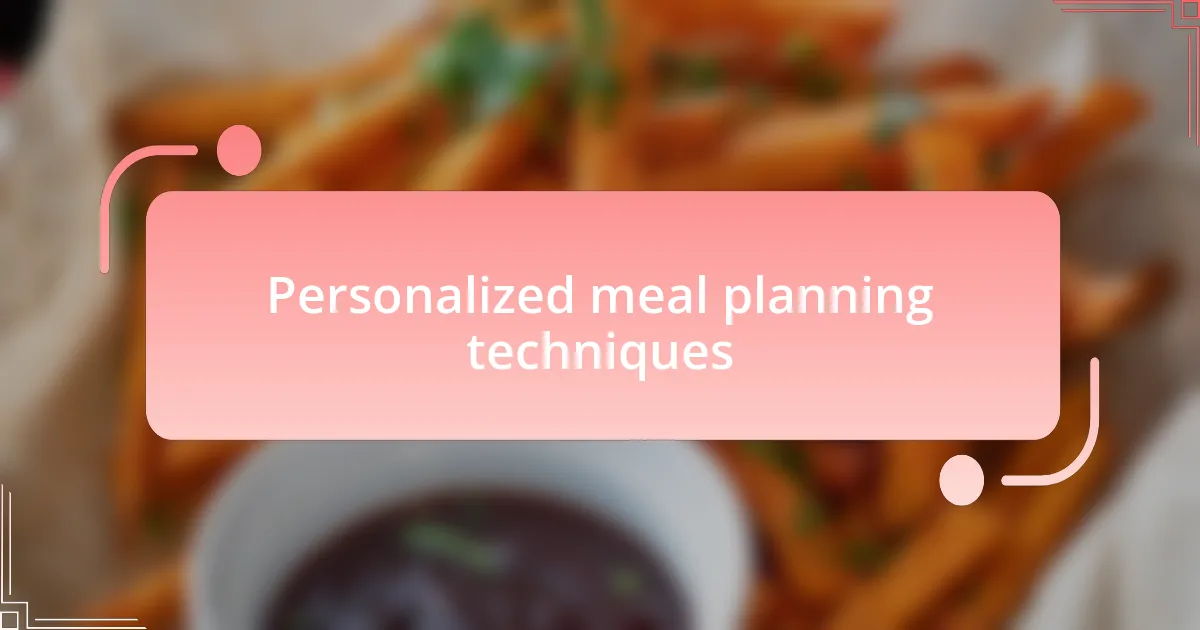
Personalized meal planning techniques
Finding a personalized approach to meal planning was crucial for me in overcoming burnout. I discovered that customizing my meals according to the week’s mood or activities was a game-changer. For instance, on busy weeks, I opt for quick, vibrant salads with whatever I have on hand, while more relaxed weekends invite me to experiment with new recipes. Doesn’t it feel satisfying to adapt your meals to fit your life rather than the other way around?
One technique that truly resonated with me was creating a flexible meal framework. I categorized my meals into themes—Meatless Mondays or Taco Tuesdays—essentially taking the pressure off by setting a guiding structure. This technique reignited my creativity, allowing me to mix ingredients within these themes. Have you ever tried giving your meals a fun twist like that? It can turn routine into an enjoyable adventure!
Moreover, I started leveraging batch cooking in a way that suited my lifestyle. Instead of prepping every single meal, I focus on preparing key components—like grains, roasted veggies, or proteins—that I can mix and match throughout the week. This strategy not only saved me time but also made each meal feel new and exciting. Can you remember the last time you looked forward to each meal because you knew you could personalize it? That anticipation transformed my view on meal planning entirely.
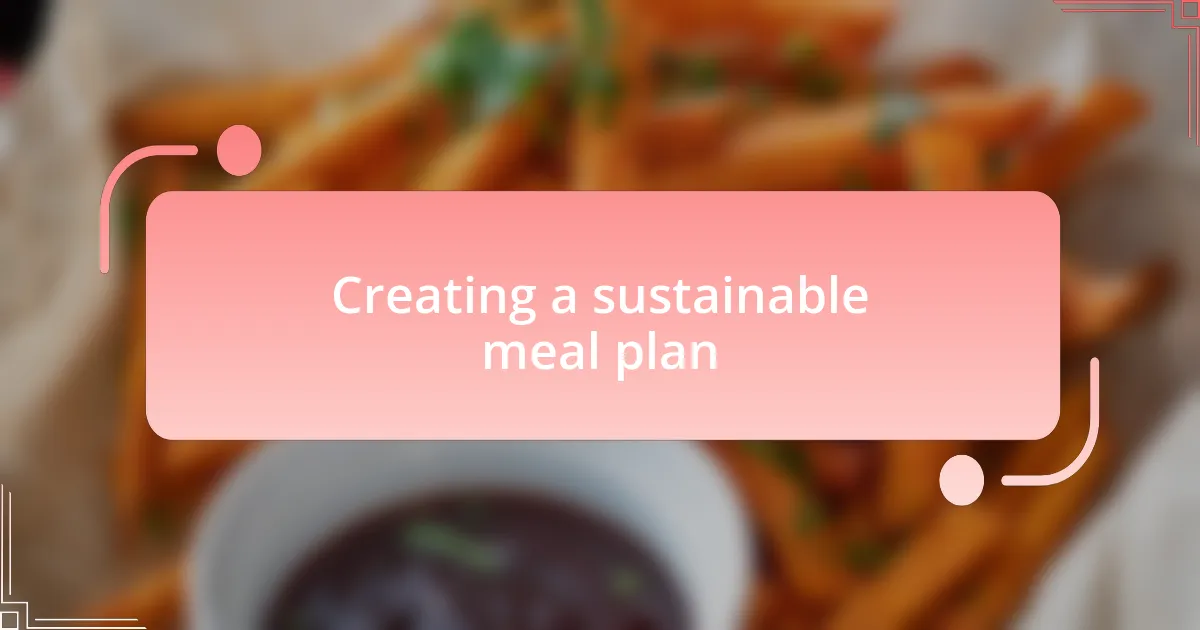
Creating a sustainable meal plan
When creating a sustainable meal plan, I realized that simplicity is key. I now limit my options to a handful of go-to meals that I genuinely enjoy. This makes grocery shopping easier and reduces the overwhelming feeling of too many choices. Have you noticed how less can sometimes feel like more?
One approach that worked wonders for me is planning meals around seasonal ingredients. There’s something so invigorating about using fresh produce straight from the farmer’s market. I find that when I focus on what’s in season, it not only enhances the flavor of my meals but also connects me with the rhythms of nature. Have you ever explored how your local seasons affect your meal choices?
I also learned to incorporate my family’s preferences into the mix, creating a collaborative meal planning experience. I started hosting a weekly “meal brainstorm” where everyone pitches their favorite dishes. This practice not only nurtured excitement but also strengthened our bond around the dinner table. It’s amazing how inviting input can transform meal planning from a chore into a shared adventure, isn’t it?
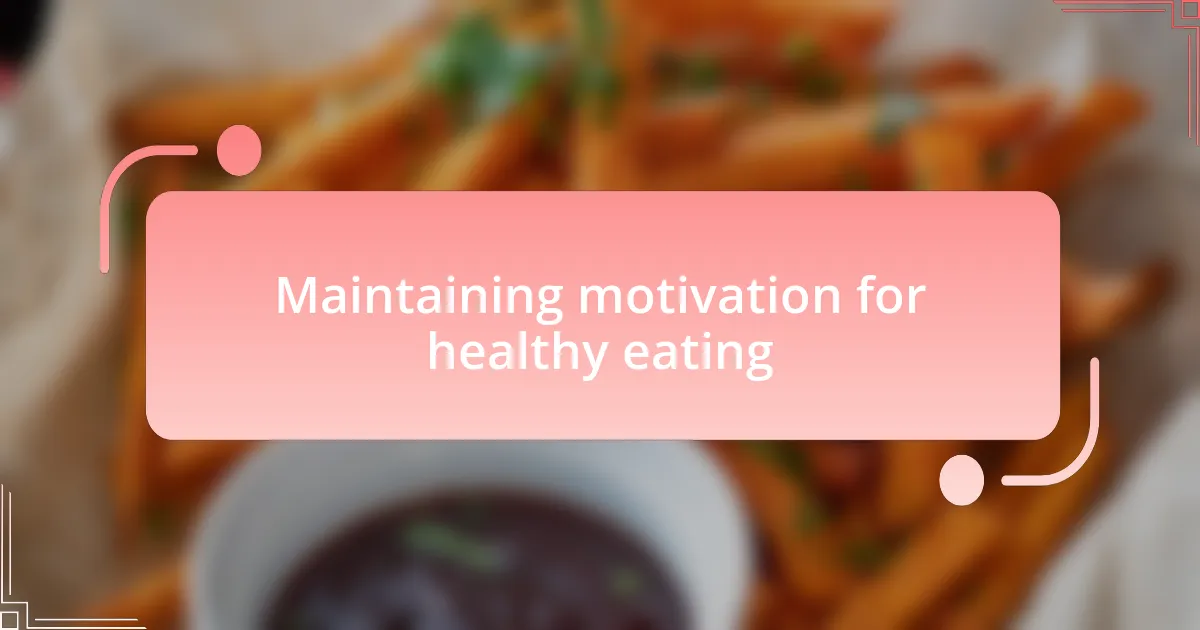
Maintaining motivation for healthy eating
Staying motivated in my healthy eating journey was all about finding what truly excited me. I remember when I tried a new cooking class focused on international cuisine; suddenly, my meals became more than just nourishment—they turned into a delightful experience. Have you ever felt that rush of inspiration when exploring new flavors?
I also found it helpful to create a visual reminder of my goals. I created a dedicated spot in my kitchen for pictures of my favorite healthy meals and snacks. Every time I walked by, I felt that surge of motivation to whip up something delicious instead of reaching for quick, less healthy options. Isn’t it fascinating how a simple picture can reignite our passion for cooking?
Another exciting strategy was tracking my progress in a journal. I documented not only what I ate but also how certain meals made me feel—energetic, satisfied, or even a bit sluggish. Reflecting on these experiences helped me understand what worked best for my body and kept my motivation alive. Have you ever considered how your food choices directly impact your emotions and energy levels? It’s amazing how awareness can transform our relationship with food.